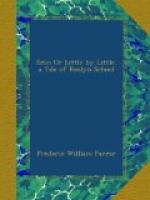“It is more than blackguardly—it is deadly,” answered Russell; “my father said it was the most fatal curse which could ever become rife in a public school.”
“Why do masters never give us any help or advice on these matters?” asked Eric thoughtfully.
“In sermons they do. Don’t you remember Rowlands’ sermon not two weeks ago on Kibroth-Hattaavah? But I for one think them quite right not to speak to us privately on such subjects, unless we invite confidence. Besides, they cannot know that any boys talk in this way. After all, it is only a very few of the worst who ever do.”
They got up and walked home, but from day to day Eric put off performing the duty which Russell had advised, viz.—a private request to Bull to abstain from his offensive communications, and an endeavor to enlist Duncan into his wishes.
One evening they were telling each other stories in No. 7. Bull’s turn came, and in his story the vile element again appeared. For a while Eric said nothing, but as the strain grew worse, he made a faint remonstrance.
“Shut up there, Williams,” said Attlay, “and don’t spoil the story.”
“Very well. It’s your own fault, and I shall shut my ears.”
He did for a time, but a general laugh awoke him. He pretended to be asleep, but he listened. Iniquity of this kind was utterly new to him; his curiosity was awakened; he no longer feigned indifference, and the poison flowed deep into his veins. Before that evening was over, Eric Williams was “a god, knowing good from evil.”
O young boys, if your eyes ever read these pages, pause and beware. The knowledge of evil is ruin, and the continuance in it hell. That little matter—that beginning of evil,—it will be like the snowflake detached by the breath of air from the mountain-top, which, as it rushes down, gains size, and strength, and impetus, till it has swollen to the mighty and irresistible avalanche that overwhelms garden, and field, and village, in a chaos of undistinguishable death.
Kibroth-Hattaavah! Many and many a young Englishman has perished there! Many and many a happy English boy, the jewel of his mother’s heart,—brave, and beautiful, and strong,—lies buried there. Very pale their shadows rise before us—the shadows of our young brothers who have sinned and suffered. From the sea and the sod, from foreign graves and English churchyards, they start up and throng around us in the paleness of their fall. May every schoolboy who reads this page be warned by the waving of their wasted hands, from that burning marle of passion, where they found nothing but shame and ruin, polluted affections, and an early grave.
CHAPTER X
DORMITORY LIFE
[Greek: Aspasiae
trillistos hepaeluths nux herebennae.]
HOM.




